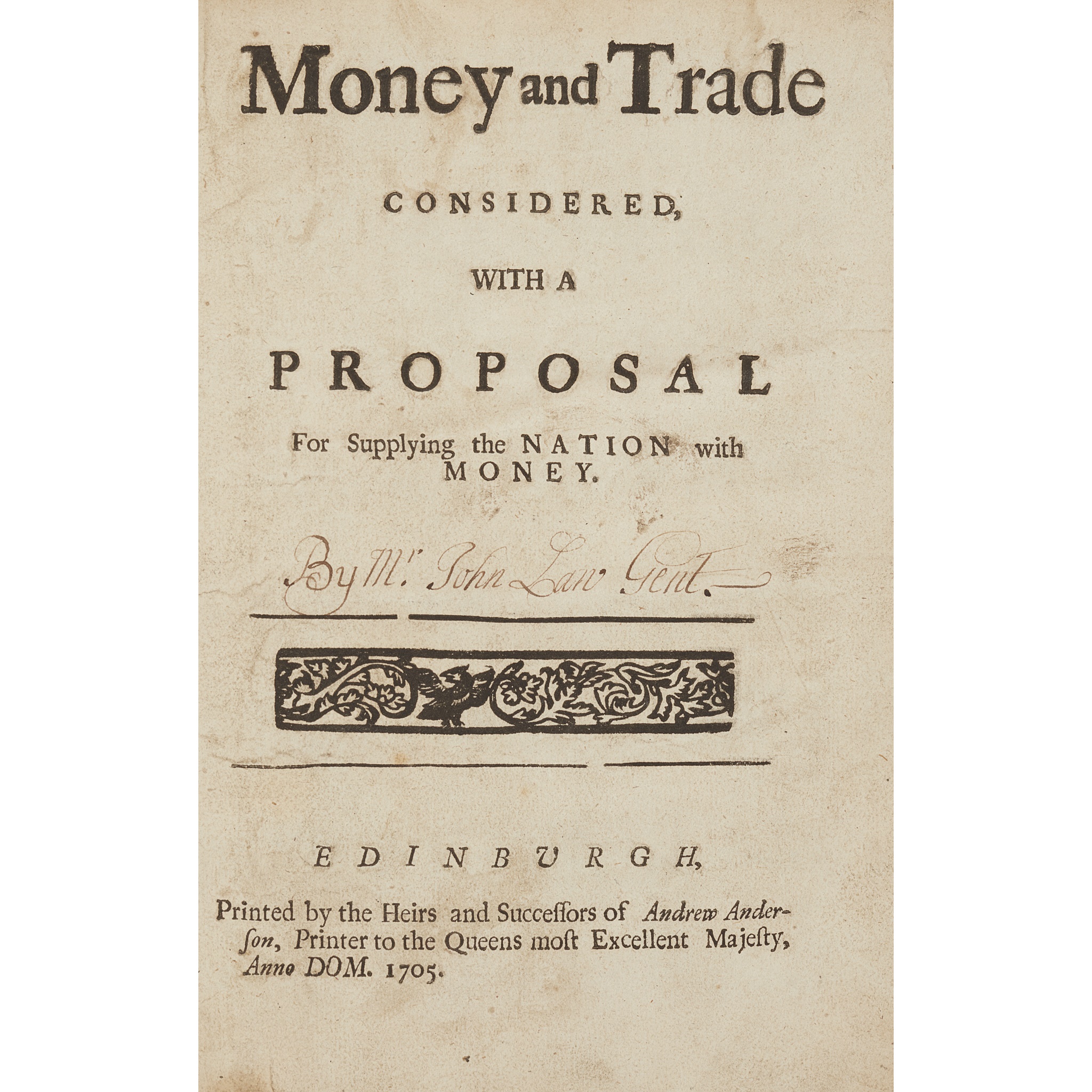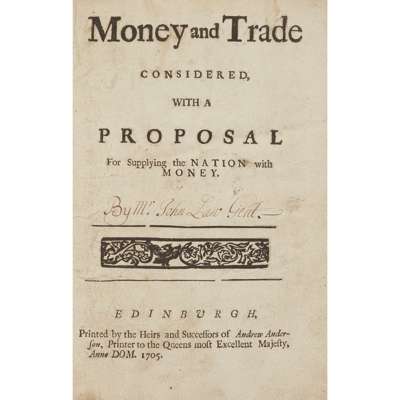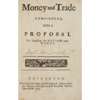
Lot 121

Law, John
Money and Trade Considered


Rare Books, Manuscripts, Maps & Photographs
Auction: 13 July 2022 from 10:00 BST
Description
with a Proposal for Supplying the Nation with Money. Edinburgh: Heirs and Successors of Andrew Anderson, 1705. First edition, small 4to, 120pp. [A2 misnumbered as '1' instead of '3'], stamps of the Institute of Bankers in Scotland to A2, ornament on the title page of eagle and vines, errata printed at foot of p. 120, early inscription on title 'By Mr John Law Gent.', contemporary calf, rebacked, early inscription on endpaper of 'Wat Paterson' and bookplate of the Library of the Institute of Bankers in Scotland, corners slightly rubbed [ESTC T097650 - 20 copies UK, 14 N. America; JISC 10 copies UK; Kress 2463]
Footnote
Note: First edition of John Law’s seminal work on banking and monetary theory; rare, with only one copy traced at auction since 1975 (Sotheby's June 30, 1983, lot 604).
Published anonymously in Edinburgh after Law’s return from exile on the continent (he had been sentenced to death at the Old Bailey in 1694 for killing a man in a duel), the work’s chief argument is that ‘an expansion in the money supply would produce an expansion in output, which [Law] considered erroneously would lead to an export surplus’ (ODNB).
In the same year as Money and Trade Law unsuccessfully presented his idea of a land bank to the Scottish parliament; he eventually found approval for the idea in France, where a general bank was established at his prompting in 1716. The following year he oversaw the establishment of the Compagnie d’Occident, known to posterity as the Mississippi Company. The collapse of the resulting bubble in 1720 led to Law’s resignation and disgrace, and he died in poverty in Venice in 1729.
Adam Smith presented the Mississippi Bubble as a lesson in the perils inherent in Law’s advocacy of the unlimited expansion of paper money. Modern authorities from Schumpeter onward have emphasised the originality and importance of Law’s contributions to monetary theory. A major recent study of John Law concluded that:
‘Money and Trade is a majestic work towering over the contemporary writings of the early eighteenth century … Law … produced a highly innovating approach to macroeconomic theorizing embracing such new discoveries as:
1) The money-in-advance requirement.
2) The circular flow of income.
3) The further analysis of international inflation in a money supply and money demand framework.
4) The formulation of the law of one price for a small open economy.
These are all major theoretical contributions which … entitle Law to consideration as an exceptional monetary theorist’ (Murphy, John Law: Economic Theorist and Policy-Maker, 1997, p. 77).
Note: 'Money and Trade Considered: With a Proposal for Supplying the Nation with Money is an early economics text written by John Law of Lauriston, published in 1705. In it, he attempts to compare the prosperity of other countries with that of Scotland, and advocates a "land bank" system of paper money backed by real estate as a commodity instead of gold or silver.
John Law examined what he found to be problems with monetary theory in Scotland. This topic had been of increasing concern for the previous 150 years, as Europe had suffered an increasing crisis known as the price revolution, where the value of gold had fluctuated wildly, and fallen overall, in large part because of the influx of additional gold plundered from the New World. Law describes the scarcity of money as being essential for its value, a lesson learned by that crisis of the previous two centuries. He describes the evolution of money this way: "He who had more goods than he had use for, would choose to barter them for silver, tho' he had no use for it; because, silver was certain in its quality: It was easy of delivery: it could be kept without loss or expense, and with it he could purchase other goods as he had occasion, in whole or part, at home or abroad, silver being divisible without loss, and of the same value in different places."
Because silver, the common money in Scotland at the time, was falling in value, he proposed land, whose value was more stable, as a replacement backing for currency. Regarding the Price Revolution, Law says: "The Spainiards bring as great Quantities into Europe as they can get wrought out of the Mines" Thus, he says, the value of metal currency has been diluted.
Remarkable in his work is the assertion that money is not something invented by government authority, which was the popular view of government authorities at the time. But he cedes, as was probably legally required of him, that government (the King) owns all money, as he owns all roads and land. He also points out that money is not actually traded for its own value, but as a tool for obtaining goods themselves.
Gavin John Adams described the impact and legacy of Money and Trade Considered as follows:
"Money and Trade Considered, With a Proposal for Supplying the Nation with Money was so much more than a mere proposal for a note-issuing bank. It was a staggeringly original work of genius which not only included proposals for new systems of banking, and the issuing of paper money as a means to stimulate the economy, but also revealed, for the first time, several of the most significant economic concepts ever devised; concepts which would later be espoused by economists such as Adam Smith and John Maynard Keynes without acknowledgement. It was meant for the consideration of the Scottish Parliament, but the ideas it contained fundamentally altered economics, politics, finance, and, consequently, the modern world. John Law’s Money and Trade Considered is the most influential but least acknowledged work in the history of economics."
The book failed to convince the Scottish government to implement a paper money system, but "contained the germ ... of the System" which Law subsequent progressed in France. Unfortunately, his implementation of this system was particularly poorly managed, suffering first extreme speculation and then rampant inflation, until failing some years later.
Friedrich Hayek saw "great perspicacity" in three aspects of Law's work: (1) the substantial qualities of a money, (2) commodity value, "anticipating many elements of the modern theory of subjective value", and (3) a historical account of money and its supply.[6]: 156–157 In summary, Hayek suggested that "The individual components of Law's proposal were nothing new... But these ideas had never been presented with equal brilliance and persuasiveness".
Provenance: William Paterson (born April 1658, Tinwald, Dumfries, Scotland—died January 22, 1719), Scottish founder of the Bank of England, writer on economic issues, and the prime mover behind an unsuccessful Scottish settlement at Darién on the Isthmus of Panama

